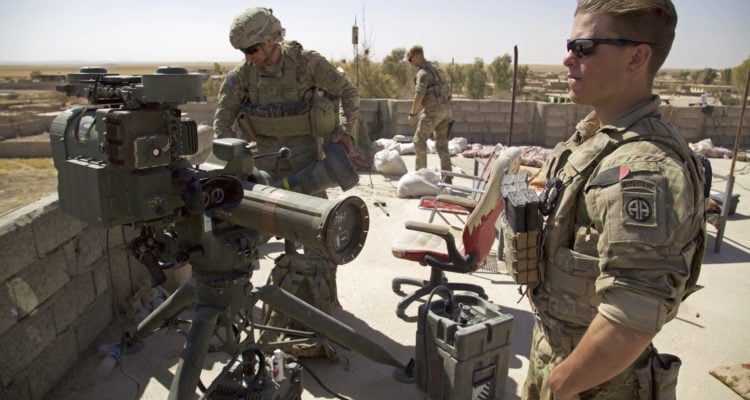Iran fired the missiles at two U.S. bases in Iraq. There were no immediate reports of casualties.
By Associated Press
Iran struck back at the United States early Wednesday for killing a top Revolutionary Guard commander, firing a series of ballistic missiles at two military bases in Iraq that house American troops in a major escalation between the two longtime foes.
It was Iran’s most direct assault on America since the 1979 seizing of the U.S. Embassy in Tehran, and Iranian state TV said it was in revenge for the U.S. killing of Revolutionary Guard Gen. Qassem Soleimani, whose death last week in an American drone strike near Baghdad prompted angry calls to avenge his slaying.
U.S. and Iraqi officials said there were no immediate reports of casualties, though buildings were still being searched. The Iraqi government later confirmed there were no casualties among Iraqi forces.
A presenter on Iranian state television later claimed, without offering evidence, that the strikes killed “at least 80 terrorist U.S soldiers” and also damaged helicopters, drones and other equipment at the Ain al-Asad air base.
The strikes, which came as Iran buried Soleimani, raised fears that the two longtime foes were closer to war. But there were some indications that there would not be further retaliation on either side, at least in the short term.
‘All is well!’ President Donald Trump tweeted shortly after the missile attacks, adding, ‘So far, so good’ regarding casualties. Moments earlier, Iran’s foreign minister tweeted that Tehran had taken “& concluded proportionate measures in self-defense,” adding that Tehran did “not seek escalation” but would defend itself against further aggression.
The killing of Soleimani — a national hero to many in Iran — and strikes by Tehran came as tensions have been rising steadily across the Mideast after Trump’s decision to unilaterally withdraw America from Tehran’s nuclear deal with world powers.
They also marked the first time in recent years that Washington and Tehran have attacked each other directly rather than through proxies in the region. It raised the chances of open conflict erupting between the two enemies, who have been at odds since Iran’s 1979 Islamic Revolution and the subsequent U.S. Embassy takeover and hostage crisis.
Iran initially announced only one missile strike, but U.S. officials confirmed both. U.S. defense officials were at the White House, likely to discuss options with Trump.
Iran’s Revolutionary Guard warned the U.S. and its regional allies against retaliating over the missile attack on the Ain al-Asad air base in Iraq’s western Anbar province. The Guard issued the warning via a statement carried by Iran’s state-run IRNA news agency.
“We are warning all American allies, who gave their bases to its terrorist army, that any territory that is the starting point of aggressive acts against Iran will be targeted,” the Guard said. It also threatened Israel.
After the strikes, a former Iranian nuclear negotiator posted a picture of the Islamic Republic’s flag on Twitter, appearing to mimic Trump who posted an American flag following the killing of Soleimani and others Friday.
Ain al-Asad air base was first used by American forces after the 2003 U.S.-led invasion that toppled dictator Saddam Hussein, and later saw American troops stationed there amid the fight against the Islamic State group in Iraq and Syria. It houses about 1,500 U.S. and coalition forces.
The U.S. also acknowledged another missile attack targeting a base in Irbil in Iraq’s semi-autonomous Kurdish region.
The Iranians fired a total of 15 missiles, two U.S. officials said. Ten hit Ain al-Asad and one the base in Irbil. Four failed, said the officials, who were not authorized to speak publicly about a military operation.
Two Iraqi security officials said at least one of the missiles appeared to have struck a plane at the Ain al-Asad base, igniting a fire. There were no immediate reports of casualties from the attacks, according to the officials, who spoke on condition of anonymity as they had no permission to talk to journalists.
About 70 Norwegian troops also were on the air base but no injuries were reported, Brynjar Stordal, a spokesperson for the Norwegian Armed Forces told The Associated Press.
Trump visited the sprawling Ain al-Asad air base, about 100 kilometers (60 miles) west of Baghdad, in December 2018, making his first presidential visit to troops in the region. Vice President Mike Pence also has visited the base.
“As we evaluate the situation and our response, we will take all necessary measures to protect and defend U.S. personnel, partners and allies in the region,” said Jonathan Hoffman, an assistant to the U.S. defense secretary.





